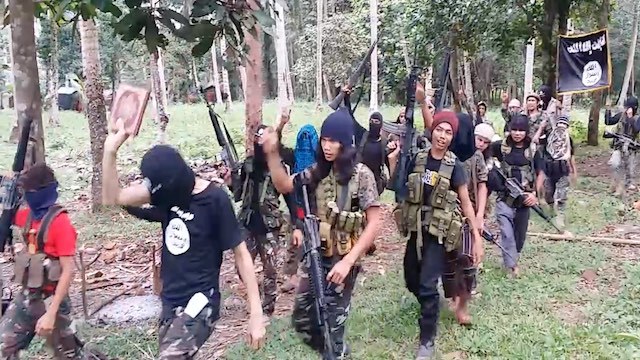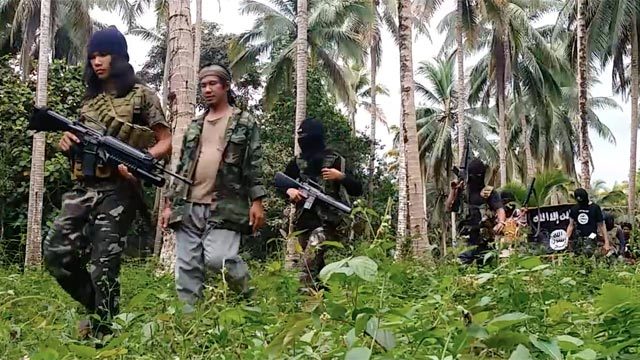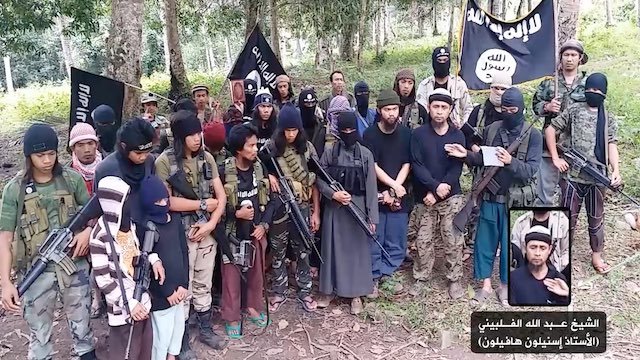Exclusive: In the age of ISIS and lone wolf attacks, is it even helpful to distinguish between what are 'ISIS-directed' and 'ISIS-inspired' activities?

ISIS or the
Islamic State in Iraq and Syria, also known as IS, ISIL, or its loose Arabic
acronym, Da’esch, is set to exploit homegrown conflicts in Southeast Asia, with
risks of a mass casualty attack growing significantly higher in the
Philippines, according to counter-terrorism and security officials from 4
different countries interviewed by Rappler.
In a 7-minute
video released on January 4 and announced last week in Arabic on ISIS’ official
newsletter, Al-Naba, Filipinos and Malaysians united 4 “battalions” in
the Philippines, and their leaders pledged allegiance to ISIS’ self-appointed
caliph, Abu Bakr al-Baghdadi, formed a shura or leadership council,
and named Abu Sayyaf ideologue Isnilon Hapilon their leader.
"The next
step ISIS is likely to take is the proclamation of wilayat Mindanao ," terror expert Rohan Gunaratna told
Rappler over the weekend.
The military has
not only dismissed our report on this.
It also declared, through its public affairs chief Colonel Noel Detoyato, that "there is no ISIS here."
Detoyato said:
“There is a difference between ISIS-directed and ISIS-inspired.”
It’s a
distinction that many consider moot in the age of ISIS and lone wolf attacks,
especially since the Filipino groups are following the steps outlined in ISIS
manuals and publications, and their videos are shared by ISIS
propaganda outlets.
“Given the attack
in Paris, the attacks in San Bernardino, the growth of Boko Harum, the growing
strength of the Abu Sayyaf in Sulu and Basilan, the upcoming elections and the
failure of the BBL (Bangsamoro Basic Law), I think people need to lean towards
being alarmist and not complacent,” said Justin Richmond, a former US army
special operations operative who later worked on stabilization projects for
USAID and other international aid groups. As a forward deployed engineer with
Palantir Technologies, he designed a platform for stability and resilience in Syria that he adapted to the Philippines
“The AFP are the
only people dealing with this, but they are grossly incentivized to NOT tell
the truth,” said Richmond ISIS grew. This is the way Boko Haram grew.”
This video
signals a shift, according to former US Special Forces Colonel David Maxwell,
who commanded two missions of the Joint Special Operations Task
Force-Philippines (JSOTF-P). He is now the Associate Director for the Centre
for Security Studies at Georgetown
University
“Four ISIS
‘battalions’ in the midst of ongoing conflict that adopts ISIS
tactics and strategy could significantly change the security situation and undo
much of the progress, particularly with the MILF peace settlement,” wrote
Maxwell in an email to Rappler.
Steps to
declaring a province
Hapilon, the
declared ISIS leader in the video, is the ideologue and last of the 5 Abu
Sayyaf leaders who in 2000 kidnapped 20 hostages, mostly Western tourists, from
an island in Malaysia
While all 4
groups had pledged their individual loyalty earlier, their convergence in the
video fulfills the 4th of 5 steps before ISIS
declares a wilayat or province. This would allow the Southeast Asian
group to receive funding and support from what may be the world’s richest
terrorist organization.

ISIS succeeded
where al-Qaeda failed, capturing and holding territory in Syria and Iraq
(Watch: Q&A: ISIS in Southeast Asia)
(Watch: Q&A: ISIS in Southeast Asia)
Issue 7 of ISIS ’ multi-language Dabiq magazine outlines the
application process for a wilayat in detail: moving from an active
propaganda campaign highlighting the bay’at, the public declaration of
allegiance to al-Baghdadi; unifying the jihadist groups in one area; then
creating a ruling council and choosing a leader.
The next step is
to craft a military strategy and set plans for future operations that would
allow ISIS to consolidate territory in the
region. The proposal must then be presented to ISIS
leadership for approval.
ISIS has
officially recognized several provinces outside its base in Iraq and Syria ,
within Egypt , Libya , Algeria ,
Yemen , Saudi Arabia , Nigeria ,
Afghatnistan , Pakistan
and the Northern Caucasus .
In March 2015,
Nigerian-based Boko Haram became the largest and most lethal jihadi group to
create a province and receive support from ISIS .
It followed the same strict process now nearly concluded by the the groups in
the Philippines
Mass-casualty
attacks to follow?
Shortly after
declaring allegiance like the Filipinos and Malaysians did in the video, groups
applying often carry out an attack or act of brutality to show their capability
and commitment to ISIS .
“That’s how you
get money,” said Richmond Philippines
Australian
Southeast Asian expert Greg Barton agrees.
“There is reason
to be concerned that ISIS will succeed in inspiring a Paris November 13 style
mass casualty attack in Southeast Asia in the coming year,” Barton wrote in an
email response to questions from Rappler.
“The Philippines
“Preparations to
proclaim an ISIS branch in the southern Philippines Singapore ISIS brand of Islam,
ISIS-type beheadings and mass killings and attacks are likely,” he added.
“ISIS is
determined to declare at least one province in Asia
in 2016.”
Back to
the future
Video clips
released by ISIS social media accounts in the last 3 months show training camps
in the southern Philippines, which once acted as the training hub for Jemaah
Islamiyah (JI), once al-Qaeda’s arm in Southeast Asia.
“The Philippines Philippines and Malaysia
In November 2015,
a group calling itself “ISIS in Mindanao ”
released a video on social media threatening to attack the APEC
summit attended by 17 world leaders.
Intelligence and security officials consulted by Rappler said another video released in December 2015 shows the same area in Central Mindanao as the November video.
This latest video uploaded on a dark web jihadi forum Shumukh al-Islam on January 4, 2016 shows 41 militants, most armed, carrying the black flag now associated with ISIS.
Here is a transcript of the video (the translation of bay'at is at the end of the article):
“Sheikh Abu Abdullah Ustadz Isnilon Hapilon is recently named by the Council (Ahlus Shura) to be our overall emir in the Philippines. He is the emir of Al Harakatul al-Islamiyah in Basilan, which was headed previously by our martyred Sheikh Abdurajak Abubakar Janjalani (may Allah bestow his mercy upon him). And this is brother Abu Anas Almuhajir, emir of Ansar Sharia Battalion. Here is another brother Abu Haris from the Ma’rakapt Al-Ansar Battalion in Sulu, whose leader is brother Abu Ammar.”
“All of these battalions have previously pledged allegiance to the Caliph. May Allah protect him. At this point in time, we will declare our pledge of allegiance to be led by our new leader brother Ustadz Abu Abdullah. May Allah reward him well.”
ISIS is grafting onto the same networks once used by al-Qaeda. The more extremist members of the MILF and the Abu Sayyaf, who supported JI, splintered off to form many of the groups that have pledged allegiance to ISIS.
(Watch: Rappler Talk: ISIS in Southeast Asia)
3 Malaysians
One of the groups in the video is Ansar al-Khilafa, which pledged allegiance to ISIS in August, 2014. Shortly after, it released a video threatening to deploy suicide bombers and make the Philippines “a graveyard” for American soldiers. The Philippine police, working with their Indonesian counterparts, foiled at least 2 attempts to transport weapons to Mujahidin Indonesia Timur, another JI offshoot in Indonesia.
At least 3 Malaysians are identified among the Filipinos in the video: University Malaya comparative religion lecturer Mahmud Ahmad, known as Abu Handzalah; and, former municipal council employee Muhammad Joraimee Awang Raimee. Both are on the Malaysian police’s wanted list since April 2014.
The third Malaysian is the leader of the Ansar Sharia Battalion, Abu Anas al-Muhajir. Abu Anas is Mohammad Najib Hussein, an engineer and sundry shop owner, whom the Philippine military claims was killed in Basilan in December 2015. There has been no independent verification and no body recovered at this time.
After the undated ceremony in the video, the Islamic State said: “The unification of the Mujahideen under one leadership and banner of the Caliphate is seen as a huge threat to the tyrants of the Philippines and is an important step in order to liberate areas in Southeast Asia in general.”
Maxwell emphasized that the Philippine government has tools to address this.
“I wonder if the government could co-opt the MILF to address this threat as ISIS must be nearly as much a threat to them as to the Philippine government," he said in an email.
The MILF, the Moro Islamic Liberation Front, the largest Muslim separatist group, has been negotiating for peace with the Philippine government for nearly two decades. In 2014, both sides signed a peace agreement that proposed the creation of an autonomous region in the south, but the bill it created, the Bangsamoro Basic Law (BBL), has failed to pass Congress.
That is creating feelings of insecurity and emphasizing failed promises for the 5% Muslim minority in the Philippines, Asia’s largest Roman Catholic nation.
Military denial
“They are not ISIS,” said AFP public affairs chief Colonel Noel Detoyato on January 11. He was echoed a day later by military spokesman Colonel Restituto Padilla, who told reporters, “There is no credible, verified and direct link established and the possibility of establishing a satellite is unlikely.”
Barton warned against underestimating an enemy as sophisticated as ISIS.
“It would be unwise to underestimate ISIS and the growing threat in the region,” warned Barton. “They have been effective – more effective than any other terrorist group in history – at recruiting.”
“You have vulnerable rural populations that are being extorted. They’re being exploited and lack the defences to protect themselves,” added Richmond. “These groups are largely able to operate with impunity until they cross the line, like posting a video - at which point they’re usually strong enough to hurt the AFP, and there really isn’t any inter-agency, governmental and international effort to mitigate this. And that’s the problem.”
Shift to elections and China
Starting January 10, commanders of the Philippine National Police have been reassigned to guard against election violence across the Philippines, preparing for the May 2016 presidential elections, when more than 54 million voters will elect more than 18,000 officials.
It doesn’t help that the US special forces which once worked in Sulu, Basilan and Central Mindanao against the Abu Sayyaf and other extremist groups since 2002 ended their mission last year. The new agreement between the Philippines and the United States, declared constitutional by the Philippine Supreme Court Tuesday, January 12, redeploys forces against the maritime threat posed by China in the South China Sea (in Philippine waters, it’s the West Philippine Sea).
“The US remains committed to working with our coalition to degrade and destroy ISIL,” US Embassy spokesman Kurt Hoyer told Rappler when asked about the video. ISIL is what the US government uses to refer to ISIS. “We continue to monitor the issue of ISIL influence globally, including in the Philippines in collaboration with our partners in the police and military.”
“The Philippine military commanders never brief anything but success, and I don’t fault them,” said Richmond, who has seen the threat landscape evolve.
“The marines down there are the only ones doing anything for counter-radicalization so I want to cast them in a good light. However, they aren’t the tools for this job. They probably only cover 10-15% of the entire mission. The fault really lies with local government, the national government, and obviously the international parties that are concerned with this.”
Below is the translation of the Ba'yat or Pledge of Allegiance:
In the name of Allah, the most gracious and the most merciful. Praise be to Allah, Lord of the Universe. Peace and blessings be upon Prophet Mohammed and his family and upon his nible companions.
God said in the Koran, "And hold fast to the rope of Allah and do not be disunited." The messenger of Allah said, "Whoever dies without having ba'yat on his neck, he dies the death of ignorance."
We declare our pledge to the Caliph, Sheikh Abu Bakr Al Baghdadi Al-Awwad bin Ibrahim al Hussayni al Qurashi, to hear and obey in hardship and ease, and in times when we are active and otherwise, to endure being discriminated against, and not to dispute with people in authority, and to speak the truth wherever we are, and not to fear in Allah, the blame of a blamer, and not to disagree with He to whom we listen and obey, except in explicit disbelief for which we have proof from Allah.
Allah is the witness to what we say.
Allahu Akbar! Allahu Akbar! Allahu Akbar!


No comments:
Post a Comment
Note: Only a member of this blog may post a comment.